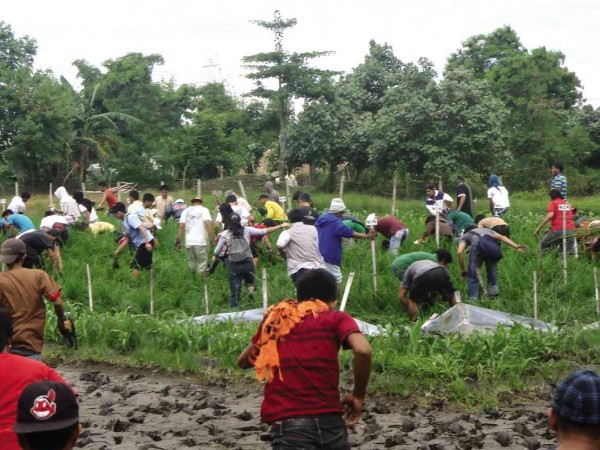
FARMERS and activists in Bicol trample upon plots of land last month in Pili, Camarines Sur, that was planted with a grains variety called “golden rice,” which has been genetically engineered. PHOTO COURTESY OF SIKWAL-GMO
SCIENCE CITY OF MUÑOZ—The government’s golden rice research project has not been delayed, despite last month’s destruction of a test area in Pili town in Camarines Sur province by activists, a Philippine Rice Research Institute (PhilRice) official said.
The Department of Agriculture field testing area in Pili, which was attacked by 300 farmer activists opposing the propagation of genetically modified organisms (GMO), was only one of five sites for the trial, said Dr. Antonio Alfonso, a PhilRice scientist and the project’s designated leader.
“We are still on track toward the completion of our golden rice project. We are now determining if the data lost in that destroyed trial in Pili will not affect the over-all results,” Alfonso said. “Then we will submit all the gathered data to the Bureau of Plant Industry for evaluation,” he added.
According to Alfonso, testing continues at the PhilRice compounds in San Mateo town in Isabela province; in Batac City in Ilocos Norte province; in this city in Nueva Ecija province; and in Tigaon town in Camarines Sur.
The field trials in these sites have either been completed or would be wrapped up as the plant’s fruits have matured.
Last tests
Alfonso said the current trials are the last of three season-long tests for the new grain that has increased beta carotene content, which the body consumes and converts into Vitamin A that helps improve eyesight.
A season spans three months, covering the typical planting process that begins with the growing of seeds, which are transplanted into the fields and are harvested when the palay matures.
Alfonso said the field-testing of golden rice is one of various processes undertaken in the research and development stage of the project before the grain is allowed to be sold in the market.
He said the project also requires data concerning biosafety.
“Pseudo-farmers”
Dr. Eufemio Rasco, PhilRice executive director, said “pseudo-farmers” took part in the “deliberate uprooting and trampling of the rice plants in the experimental plots in Pili.”
“Real farmers care for their crops and will not do that,” he said.
But farmers and environment groups have vowed to stop the release of the golden rice to local farms and markets due to health and environmental concerns.
Rasco said PhilRice will continue evaluating the potentials of the golden rice in addressing the problem of Vitamin A deficiency, along with the International Rice Research Institute (Irri) and other leading nutrition and agricultural research organizations.
He said the trials comply with government regulations.
Started in 2004, the golden rice research project was financed by the Bill and Melinda Gates Foundation, the Rockefeller Foundation and the United States Agency for International Development (USAID).
Irri and the Helen Keller International, a nonprofit organization dedicated to preventing blindness and reducing malnutrition worldwide, are the institute’s partners in the project.
“We are hoping that we can complete the final field-testing this year despite the small setback,” Alfonso said, referring to the Pili incident.